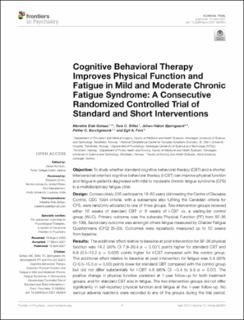| dc.contributor.author | Gotaas, Merethe Otelie Eide | |
| dc.contributor.author | Stiles, Tore C | |
| dc.contributor.author | Bjørngaard, Johan Håkon | |
| dc.contributor.author | Borchgrevink, Petter Chr. | |
| dc.contributor.author | Fors, Egil Andreas | |
| dc.date.accessioned | 2021-09-28T09:28:29Z | |
| dc.date.available | 2021-09-28T09:28:29Z | |
| dc.date.created | 2021-07-30T16:56:44Z | |
| dc.date.issued | 2021 | |
| dc.identifier.citation | Frontiers in Psychiatry. 2021, 12 1-12. | en_US |
| dc.identifier.issn | 1664-0640 | |
| dc.identifier.uri | https://hdl.handle.net/11250/2784040 | |
| dc.description.abstract | Objective: To study whether standard cognitive behavioral therapy (CBT) and a shorter, interpersonal oriented cognitive behavioral therapy (I-CBT) can improve physical function and fatigue in patients diagnosed with mild to moderate chronic fatigue syndrome (CFS) in a multidisciplinary fatigue clinic. Design: Consecutively 236 participants 18–62 years old meeting the Centre of Decease Control, CDC 1994 criteria, with a subsample also fulfilling the Canadian criteria for CFS, were randomly allocated to one of three groups. Two intervention groups received either 16 weeks of standard CBT or 8 weeks of I-CBT vs. a waiting-list control group (WLC). Primary outcome was the subscale Physical Function (PF) from SF-36 (0–100). Secondary outcome was amongst others fatigue measured by Chalder Fatigue Questionnaire (CFQ) (0–33). Outcomes were repeatedly measured up to 52 weeks from baseline. Results: The additional effect relative to baseline at post-intervention for SF-36 physical function was 14.2 (95% CI 7.9–20.4 p < 0.001) points higher for standard CBT and 6.8 (0.5–13.2 p = 0.036) points higher for I-CBT compared with the control group. The additional effect relative to baseline at post-intervention for fatigue was 5.9 (95% CI 0.5–10.5 p = 0.03) points lower for standard CBT compared with the control group but did not differ substantially for I-CBT 4.8 (95% CI −0.4 to 9.9 p = 0.07). The positive change in physical function persisted at 1-year follow-up for both treatment groups, and for standard CBT also in fatigue. The two intervention groups did not differ significantly in self-reported physical function and fatigue at the 1-year follow-up. No serious adverse reactions were recorded in any of the groups during the trial period. Interpretation: A 16-week standard, individual CBT intervention improves physical function and fatigue in CFS outpatients with mild to moderate disease. A shorter 8-week I-CBT program improves physical function. Both treatments are safe, and the effect persist 1 year after baseline. Clinical Trial registration: ClinicalTrials.gov, Identifier: NCT00920777, registered June 15, 2009. | en_US |
| dc.language.iso | eng | en_US |
| dc.publisher | Frontiers Media | en_US |
| dc.rights | Navngivelse 4.0 Internasjonal | * |
| dc.rights.uri | http://creativecommons.org/licenses/by/4.0/deed.no | * |
| dc.title | Cognitive Behavioral Therapy Improves Physical Function and Fatigue in Mild and Moderate Chronic Fatigue Syndrome: A Consecutive Randomized Controlled Trial of Standard and Short Interventions | en_US |
| dc.type | Journal article | en_US |
| dc.type | Peer reviewed | en_US |
| dc.description.version | publishedVersion | en_US |
| dc.source.pagenumber | 1-12 | en_US |
| dc.source.volume | 12 | en_US |
| dc.source.journal | Frontiers in Psychiatry | en_US |
| dc.identifier.doi | 10.3389/fpsyt.2021.580924 | |
| dc.identifier.cristin | 1923197 | |
| cristin.ispublished | true | |
| cristin.fulltext | original | |
| cristin.qualitycode | 1 | |

